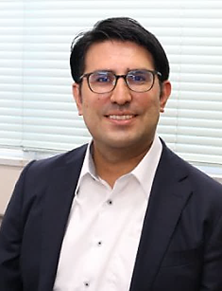Advanced Electrophysiological Modelling for Non-Invasive Neurostimulation in Humans
時間地點:10:00 am, Nov 05 (Tue), 2024; R1-1042 Conference Room
研討講者:Jose Gomez-Tames, PhD
September 25, 2024
Abstract
Neurotechnologies are gaining international attention as promising medical treatments that stimulate or modulate neuronal functions through electrical currents, offering an alternative to medications without their associated side effects. One such technique is transcranial electrical stimulation (tES), which delivers electric currents into the brain via electrodes attached to the scalp. However, a significant challenge lies in achieving precise stimulation, as the tES-generated electric field in the brain is influenced by the complex anatomy and electrophysiology of human tissues. Additionally, our understanding of how in vivo-induced electric currents interact with neural structures remains limited.
This talk will explore electric field computations using anatomical human head models and the advanced optimization of stimulation parameters, enabling precise control over the focality and direction of the electric field. We will also discuss current trends in extending electric field analysis to include temporal effects through the integration of biophysical dynamic neural modeling.
Jose Gomez-Tames, PhD
Neural Systems Engineering Lab (NSEL), Center for Frontier Medical Engineering
Department of Medical Engineering Chiba University

Jose Gomez-Tames, PhD
Jose Gomez-Tames was born in Cartago, Costa Rica. He received the B.S. degree in electronics engineering from the Institute of Technology of Costa Rica, Cartago, Costa Rica, in 2007 and the M.S. and Ph.D. degrees in medical system engineering from Chiba University, Chiba, Japan, in 2012 and 2015, respectively. From 2007 to 2009, he was an Instructor at the Institute of Technology of Costa Rica. From 2015 to 2016, he was a Research Fellow of the Japan Society for the Promotion of Science. From 2016 to 2019, he was a Research Assistant Professor and Research Associate Professor at Nagoya Institute of Technology, Nagoya, Japan, and Associate Professor since 2020. From 2022, he is an associate professor at Chiba University. He is the author of more than 80 papers published in international journals and conference proceedings. His research interests include computational bioelectromagnetic, neural engineering, and biomedical applications.
Jose Gomez-Tames, PhD
Neural Systems Engineering Lab (NSEL), Center for Frontier Medical Engineering
Department of Medical Engineering Chiba University

Jose Gomez-Tames, PhD
Jose Gomez-Tames was born in Cartago, Costa Rica. He received the B.S. degree in electronics engineering from the Institute of Technology of Costa Rica, Cartago, Costa Rica, in 2007 and the M.S. and Ph.D. degrees in medical system engineering from Chiba University, Chiba, Japan, in 2012 and 2015, respectively. From 2007 to 2009, he was an Instructor at the Institute of Technology of Costa Rica. From 2015 to 2016, he was a Research Fellow of the Japan Society for the Promotion of Science. From 2016 to 2019, he was a Research Assistant Professor and Research Associate Professor at Nagoya Institute of Technology, Nagoya, Japan, and Associate Professor since 2020. From 2022, he is an associate professor at Chiba University. He is the author of more than 80 papers published in international journals and conference proceedings. His research interests include computational bioelectromagnetic, neural engineering, and biomedical applications.